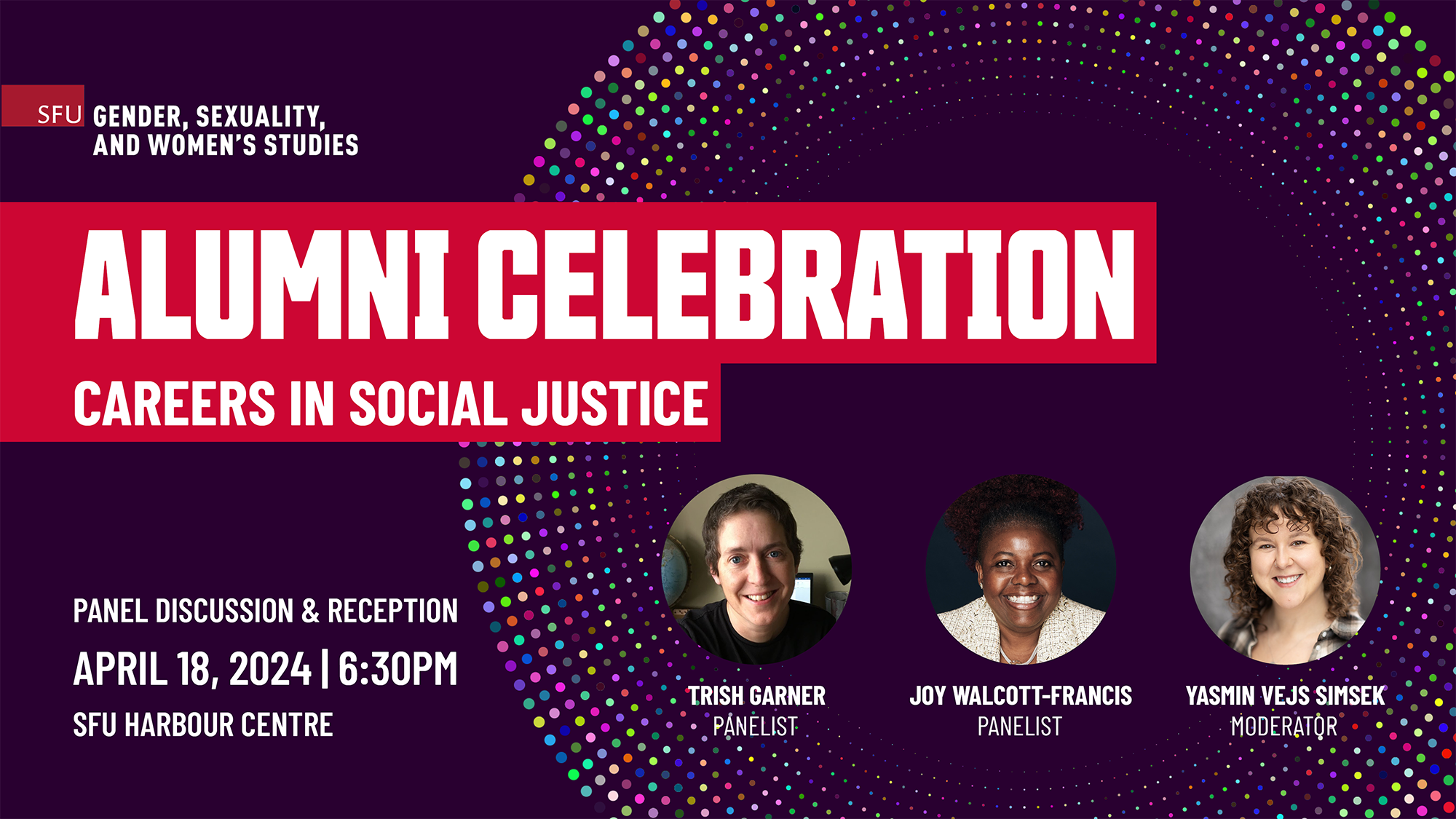
Alumni
GSWS Alumni Celebration: Panelists share insights into careers in social justice
After graduating with a well-rounded understanding of social movements, activism, and human rights, many alumni of the Department of Gender, Sexuality, and Women's Studies (GSWS) at Simon Fraser University (SFU) are motivated to use their skillset to influence positive change in their workplaces and communities.
On April 18, 2024, SFU GSWS invites our community — including current students and alumni, as well as current and retired faculty — to a networking reception and panel discussion with notable SFU GSWS alumni who have dedicated their careers to furthering social justice causes.
With an eye to inspiring our alumni and students on their own meaningful career paths, Yasmin Vejs Simsek (she/her), an author, actor and activist who holds her master of arts in GSWS, will moderate a stirring conversation with our panelists, Joy Walcott-Francis (she/her) and Trish Garner (they/them) — both of whom are GSWS PhD alumni. Walcott-Francis is Director of Equity, Diversity, and Inclusion at Langara College. Garner (they/them) is Director of Policy and Strategic Initiatives at the BC Federation of Labour.
To provide our event guests with a preview of what to expect from the panel discussion, we asked Simsek, Walcott-Francis, and Garner the following questions about their experiences as alumni of SFU GSWS.
From critical power analyses to hard research skills, there isn't a day when I don't use what I learned from SFU GSWS.
- Trish Garner
How has your education in GSWS prepared you for a career related to social justice?
Yasmin Vejs Simsek: I learned to think critically and outside of the box when it comes to looking at society. I have become better at not thinking of things in black/white. I was lucky to meet amazing people and build meaningful connections throughout my time at SFU. Through those connections, I found great volunteering and full-time job opportunities.
Joy Walcott-Francis: The beauty of studying in an interdisciplinary area, like GSWS, is the opportunity to participate in courses that pique your interest across different fields. SFU GSWS provided me with the opportunity to broaden my areas of interest and knowledge. I was able to bring a feminist and intersectional lens to my learning. Having those perspectives is foundational to social justice work.
Trish Garner: From critical power analyses to hard research skills, there isn't a day when I don't use what I learned from SFU GSWS. I credit the department with setting me on an empowering and enlightening path through anti-poverty community organizing and government advocacy, human rights research and policy work, and now, building worker and labour power for systemic change.
Along with what is being taught in the classroom, seek out opportunities to volunteer — to get to know and understand people's 'real' experiences and the challenges they may or may not face.
- Joy Walcott-Francis
Do you have any advice for students and alumni who are considering a career in social justice?
Yasmin Vejs Simsek: Remember to keep your empathy in hand and take care of yourself first. Without these two things, you can’t be anything to anyone else.
Joy Walcott-Francis: There is value in practical experience. Along with what is being taught in the classroom, seek out opportunities to volunteer — to get to know and understand people's 'real' experiences and the challenges they may or may not face. This helps ground your work as a practitioner.
Trish Garner: My advice for students is to take the time to ground your work in community — ensure your research is relevant and useful, connect to community groups and campaigns and, most importantly, build meaningful and reciprocal relationships with those most impacted by the issues you're working on. Embed community care in your work and self-care will follow. Also, share food and find joy!

